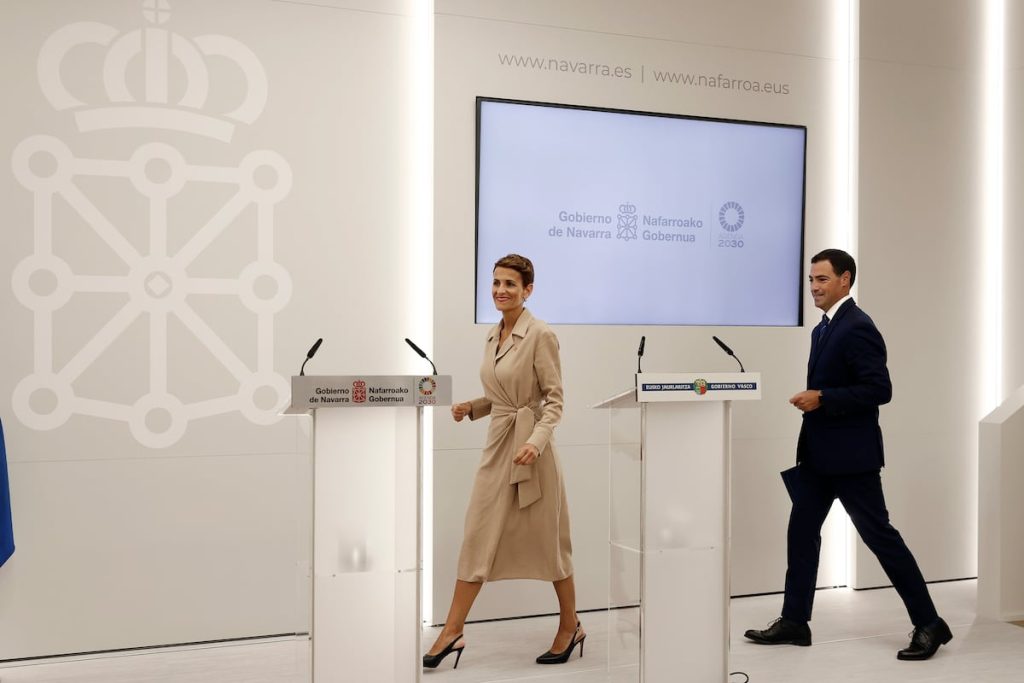This Wednesday, the first meeting between the President of Navarra, Maria Chivite, and the Basque Country’s Lehendakari, Imanol Pradales, took place at the Navarra Palace in Pamplona. Even though they did not know each other personally, during this initial encounter, a good rapport was observed between the two leaders both on a personal and institutional level. Both regional governments are coalitions, with PSOE and PNV being the main partners – in Navarra, PNV is part of a larger coalition called Geroa Bai. This initial circumstance favors interinstitutional relations between the two communities, in addition to their cultural, linguistic, and economic proximity. Navarra and the Basque Country have highly industrialized economies and their own financing systems: the Navarra economic agreement and the Basque concert. Both tools are supported by the Spanish Constitution and have come into the spotlight again after the controversy over the special financing agreement with Catalonia. Both leaders emphatically defended their respective systems.
Chivite has claimed that both the Navarra concert and the Basque agreement are “solidarity tools” and stressed the need to educate the public on this issue. Pradales also reiterated that the two instruments are “constitutionally” supported and valued by the European Union. The community advocates for the solidarity of these instruments, for instance, Navarra’s annual contribution to the Spanish government includes its participation in inter-territorial compensation funds, contributions to paying off state debt, and expenses for non-assumed competencies. This contribution is calculated based on Navarra’s economy’s contribution to the national GDP (1.6%) rather than its population share (1.35%). The Basque concert also has its solidarity agreement and carries a risk component as the central government does not participate in the revenue collected by provincial governments or cover public expenses if the revenues are insufficient. Moreover, the so-called “cupo”, the annual contribution of the Basque Country to national coffers, is not only calculated based on revenues collected in the region but also on other variables like expenses for non-assumed competencies (e.g. customs).
Chivite expressed support for opening the debate on regional financing but doubted the effectiveness of applying the same system in all regions: “I don’t know what the proposal for everyone is. We have a negotiated financing model, enshrined in the Constitution and endorsed by European institutions. We understand that other communities, like the Canary Islands, have unique financing, and I believe a debate should be opened about the financing model, but the system has not been able to be renewed even with absolute majorities of the Popular Party.” However, Pradales did not comment on this issue and instead emphasized the importance of ensuring respect for the Basque concert without turning it into a weapon in the national debate. He stressed the need to uphold its solidarity, uniqueness, and meticulous management to avoid ever needing a bailout from the State.
Beyond the regional financing system, other issues were discussed in the meeting, such as the Cantabrian-Mediterranean High-Speed Railway corridor. The Ministry of Transport is currently working on technical reports that will determine the final route to connect the high-speed railway to the Basque Y, with two options currently on the table – through Ezkio or Vitoria. However, both Chivite and Pradales refrained from expressing their preferences and stated that they would wait for all technical documentation before making a decision. They emphasized that the decision would be made jointly by Navarra, the Basque Country, and the central government. In conclusion, the meeting highlighted the positive relationship between Navarra and the Basque Country, emphasizing cooperation and common goals for the benefit of both regions.


